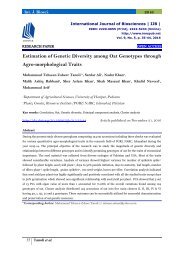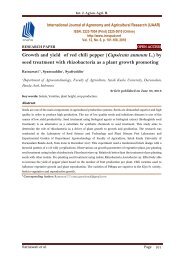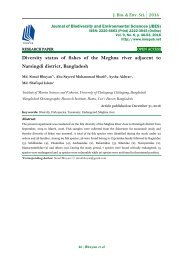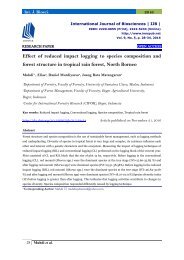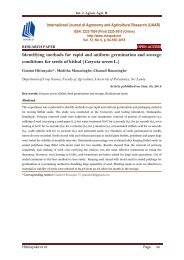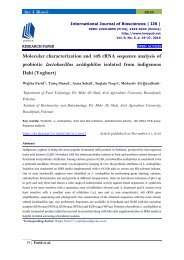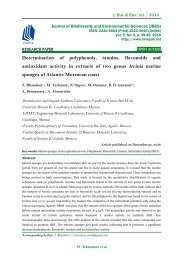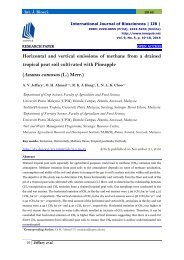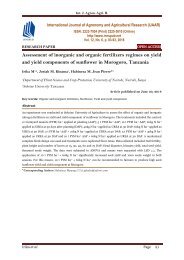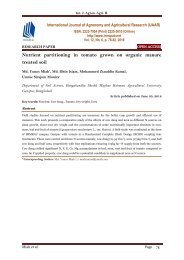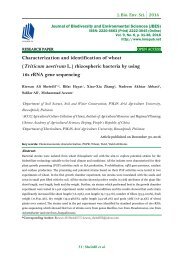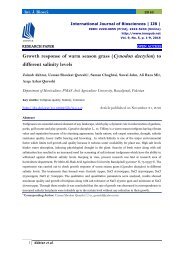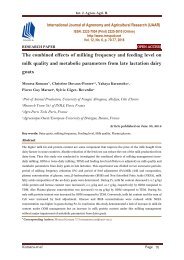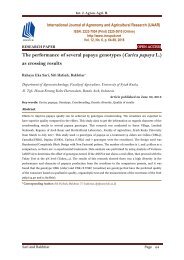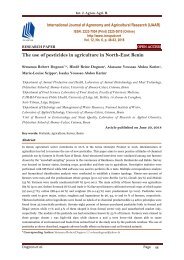In vitro response of strawberry (Fragaria x ananassa Dutch.) for callus induction and shoot regeneration
Effect of growth regulators on in vitro responses of strawberry for callus induction and shoot regeneration has been investigated. MS (Murashige and Skoog) medium supplemented with 2,4-diclorophenoxyacetic acid (3.0mg/l) and 6-Benzyl adenine (0.5mg/l) were found most effective in terms of percentage to callus inductions and degree of callus development. Calli derived strawberry explants were cultured in shoot formatting media supplemented with different concentrations of plant growth regulators. The combination of BA (1.5 mg/l) and -Napthalene acetic acid (0.75mg/l) showed highest percentage of shoot induction (55.6±0.81) and multiple shoot regeneration. Combination of BA, NAA and KIN (6-Furfuryl amino purine/kinetin) found to be most efficient in shoot induction (60.7%) and multiplications (16.7±0.48). After successful shoot regeneration, regenerated shoots were cultured for root induction in MS0. The developed plantlets through in vitro culture technique were acclimated and successfully transferred to in vivo condition for further evaluations.
Effect of growth regulators on in vitro responses of strawberry for callus induction and shoot regeneration has been investigated. MS (Murashige and Skoog) medium supplemented with 2,4-diclorophenoxyacetic acid (3.0mg/l) and 6-Benzyl adenine (0.5mg/l) were found most effective in terms of percentage to callus inductions and degree of callus development. Calli derived strawberry explants were cultured in shoot formatting media supplemented with different concentrations of plant growth regulators. The combination of BA (1.5 mg/l) and -Napthalene acetic acid (0.75mg/l) showed highest percentage of shoot induction (55.6±0.81) and multiple shoot regeneration. Combination of BA, NAA and KIN (6-Furfuryl amino purine/kinetin) found to be most efficient in shoot induction (60.7%) and multiplications (16.7±0.48). After successful shoot regeneration, regenerated shoots were cultured for root induction in MS0. The developed plantlets through in vitro culture technique were acclimated and successfully transferred to in vivo condition for further evaluations.
You also want an ePaper? Increase the reach of your titles
YUMPU automatically turns print PDFs into web optimized ePapers that Google loves.
<strong>In</strong>t. J. Agr. & Agri. R.<br />
-- = No <strong>response</strong><br />
A<br />
B<br />
C<br />
X<br />
D<br />
E<br />
F<br />
Fig 1. <strong>In</strong> <strong>vitro</strong> <strong>callus</strong> <strong>induction</strong> <strong>of</strong> <strong>strawberry</strong> from the leaf explants.<br />
A. Source <strong>of</strong> leaf explants <strong>for</strong> <strong>callus</strong> <strong>induction</strong>. B. <strong>In</strong>itiation <strong>of</strong> <strong>callus</strong> from in <strong>vitro</strong> grown leaf, 15 days after<br />
culture. C. Callus developed from in <strong>vitro</strong> grown leaf in MS with PGA, 2 weeks after culture. D. Callus<br />
developed from in <strong>vitro</strong> grown leaf in MS with PGA, 4 weeks after culture. E. Multiple <strong>shoot</strong>s regenerated in<br />
MS medium with PGA. F. Multiplication <strong>of</strong> regenerated plantlets from leaf derived calli <strong>of</strong> <strong>strawberry</strong>.<br />
Karim et al. Page 34




